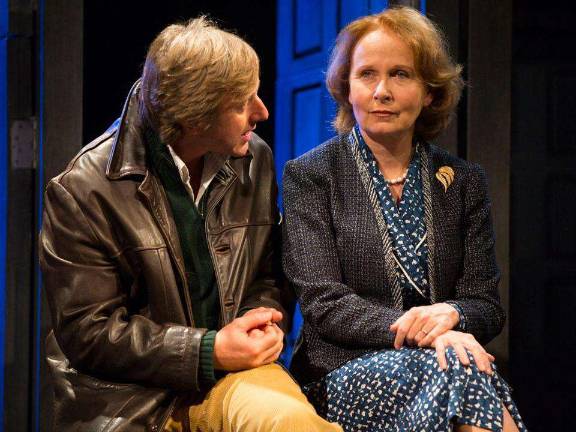Mother Knows Best

Burton makes for one killer spy in Hapgood Tom Stoppard is, rather inarguably, the leading playwright of the intellectual frontier, but even with stabs at physics and symmetry, his 1988 play Hapgood falls on the low end of the scientifically entertaining miniscus. Still, this spy-versus-spy-verus-spy thriller comedy (thromedy?) throws many bone to actors looking to demonstrate their versatility, which is why it is no surprise that Evan Yionoulis' production, part of this summer's Williamstown Theatre Festival, has drawn the superlative talents of such cast members as Kate Burton, Reed Birney, and Jake Weber. Burton is Mother (aka Elizabeth Hapgood), a cocksure spymaster (the play take place in London of 1987) required to determine who exactly has been communicating classified scientific research findings to the then-Soviet Union. She faces both support and occasional criticism from her longstanding colleague Blair (Birney); Wates (Victor Williams), an American CIA officer unused to her shortcuts, and Ridley (Euan Morton), a younger, more tempestuous agent. There's also Kerner (Weber), a Russian double agent prone to pontificate on such matters as the similarities between electrons and intelligence officers, who has a history with Mother that may extend to the personal as well as the professional. It is all too easy to get bogged down in the jargon and double crosses that ensure, but Yionoulis clearly wants his audience to have a good time, as exemplified by Mike Yionoulis' era-appropriate synth score, Donald Holder's sharp lighting design (fun fact: the former is the director's brother, the latter, his husband), Michael Krass' costume design, and especially Christopher Barreca and Christopher Heilman's set consisting of movable doors that can efficiently camouflage as just about any background. Stoppard's layering gets even murkier, throwing in the idea of twins and hinting at feminist commentary that the play never fully explores. The point, however, is that amid all this dense discussion ? and Stoppard provides much verbosity, especially through Kerner ? Hapgood is primarily a puzzle meant to be enjoyed. This means that those unable to keep up with the show's labyrinthine twists and turns won't really be at a loss. (I, for one, lost track a couple times and was still able to discern a culprit long in advance). And as Stoppard's second act devolves into the convoluted and inconsequential, one should sit back and enjoy the chance to watch Burton slink into a second role as Mother's wanton twin sister. Oh, how this fantastic actress (enjoying her eighteenth season at Williamstown) digs into the comic excesses of that pot-smoking hedonist ? but one look into the performer's eyes as this woman learns a key piece of information tells you that there isn't a character that Burton doesn't justify to the fullest and imbue with complete dimension and credibility. And Burton's certainly acting with a net; Birney, Weber and Morton are so on-point any could catch her should she fall. Birney makes it clear why he remains loyal to Mother's loose cannon ways, while Williams' frustration at said ways also make sense. Morton plays into Ridley's ambiguities very well. Weber, saddled with the show's trickiest role, handles Stoppard's mumbo-jumbo monologues and Kerner's Russian accent with the ease of a veteran while steeling reeling the audience in. Hapgood never ascends to le Carré-level espionage, nor does its playwright make it light enough to simply spoof the genre it inhabits ? there's still too much talky didacticism for that. But in the hands of these gifted performers (the show's ensemble also includes top-notch work from David Corenswet, Adam Langdon, and Sathya Sridharan) and craftsmen, Yionoulis proves that even flawed Stoppard can make for an amusing night of theatre. Mystery solved. For more information, go to http://wtfestival.org/2013/hapgood